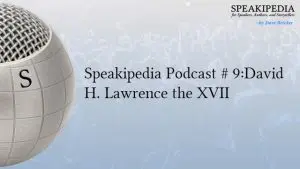Imagine a stage where there’s a wall behind the actors and one more wall on each side of the stage. The fourth wall is invisible. That’s the one the audience observes the actors through. When an actor looks at the camera or speaks to the audience, that’s called breaking the fourth wall. In the movie Deadpool,
Ryan Reynolds comes out after the credits are over and talks to the audience, a classic example of breaking the fourth wall.
You’re still here.
It’s over. Go home.
Oh, you’re expecting a teaser for Deadpool 2? Well, we don’t have that kind of money.
Spoken presentations work differently than theatrical productions in that speakers talk directly to the audience almost all the time. And here’s where we find opportunities and challenges. Most stage actors are trained to pretend the audience isn’t there. We look people in the eye, ask questions, and invite people to participate in games and exercises.
We might even walk into the audience or encourage an attendee to join us on stage. Speaking is the art of fourth-wall theater. Learn what you can from stage and screen actors and then master the engagement techniques that are unique to the art of speaking.





